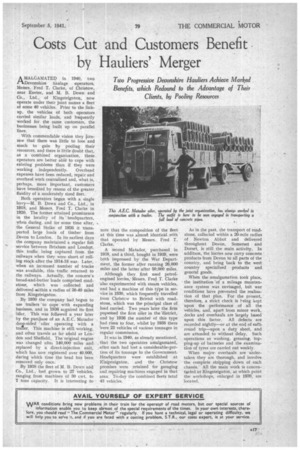Costs Cut and Customers Benefit by Hauliers' Merger
Page 19

If you've noticed an error in this article please click here to report it so we can fix it.
Two Progressive Devonshire Hauliers Achieve Marked Benefits, which Redound to the Advantage of Their Clients, bu Pooling Resources
AMALGAMATED in 1940, two Devonshire haulage operators, Messrs. Fred T. Clarke, of Christow, near Exeter, and M. B. Down and Co., Ltd., of Kingsteignton, now operate under their joint names a fleet of some 40 vehicles. Prior to the linkup, the vehicles of both operators carried similar loads, and frequently worked for the same customers, the businesses being built up on parallel lines.
With commendable vision they Oresaw that there was little to lose and much to gain by pooling their resources, and there is little doubt that, as a combined organization, these. operators are better able to cope with existing problems than if they were working independently. Overhead expenses have been reduced, repair and overhaul work centralized and, what is, perhaps, more important, customers have benefited by reason of the greater. fluidity of a moderately sized fleet.
Both operators began with a single lorry—M. B. Down and Co., Ltd., in 1918, and Messrs. Fred T. Clarke in 1920. The former attained prominence in the locality of its headquarters, when during, and for some time after, the General Strike of 1926 it transported large loads of timber from Devon to London. In its earliest days the company maintained a regular fish service between Brixharn and Londcar, this traffic being captured from the railways when they were short of rolling stock after the 1914-18 war. Later, when an increased number of trucks was available, this traffic returned to the railways. Actually, the concern's bread-and-butter loads comprised roadstone, which was collected and delivered within a radius of 30-40 miles from Kingsteignton.
By 1930 the company had begun to use trailers -to cope with expanding business, and in 1936 acquired its first Oiler. This was followed a year later by the purchase of an A.E.C. Matador drop-sided oiler operating with a trailer. This machine is still working, and often travels as far afield as London and Sheffield. The original engine was changed aftek 140,000 miles and replaced by a direct-injection unit, which has now registered over 40,000, during which time the head has been removed only once.
By 1938 the fleet of M. B. Down and Co., Ltd., had grown to 27 vehicles, ranging from machines of 30 cwt. to 7 tons capacity. It is interesting to
note that the composition of the fleet at this time was ,almost identical with that operated by Messrs. Fred T. Clarke.
A second Matador, purchased in 1938, and a third, bought in 1939, were both impressed by the War Department, the former after running 26,000 miles and the latter after 50,000 miles.
Although they first used petrolengined lorries,' Messrs. Fred T. Clarke 'also experimented with steam vehicles, and had a machine of this t3Ipe in service in 1930, which frequently travelled from Christcw to Bristol with roadstone, which was the principal class of load carried. Two years later the firm possessed the first oiler in the 'district, and by 1936 the number of this type had risen to fOur, whilst by 1938 there 'ere 23 vehicles of various tonnages in regular commission.
It was in 1940, as already mentioned, that the two operators amalgamated, after each had lost a considerable,portion of its tonnage to the Government. Headquarters were established at Kidgsteignton, .and the Christow premises were retained for garaging and repairing machines engaged in that area. To-day the combined fleets total 43 vehicles.
As in the past, the transport of roadstone, collected within a 20-mile radius of Newton Abbot and delivered throughout Devon, Somerset and Dorset, is still the main activity. In addition, the lorries now carry concrete' products from Devon to all parts of the country, and bring back to the west country specialized products and general goods.
When the amalgamation took place, the institution of a mileage maintenance system was envisaged, brit war conditions have prevented the realization of that plan. For the present, therefore, a strict check is f-eing kept upon the performance of all the vehicles, and, apart from minor work, docks and overhauls are largely based upon this factor. All defects are recorded nightly—or at the end of can round trip—upon a duty sheet, and are attended to without delay. Such operations as washing, greasing, topping-up of batteries and the examination of tyres are carried out weekly.
When major overhauls are .uhdertaken they are thorough, and involve the complete stripping down of each chassis: All the main work is concentrated at Kingsteignton, at which point the workshops, enlarged in 1939, are located.




















































